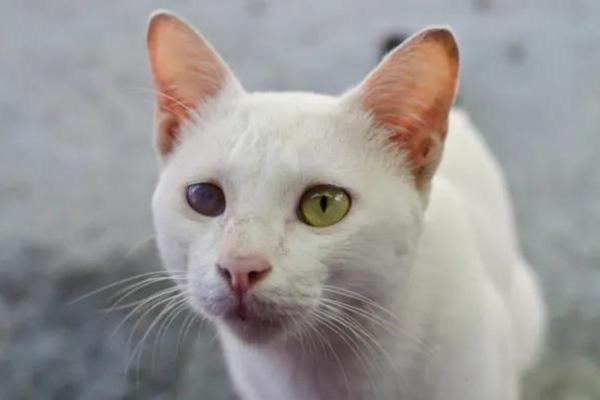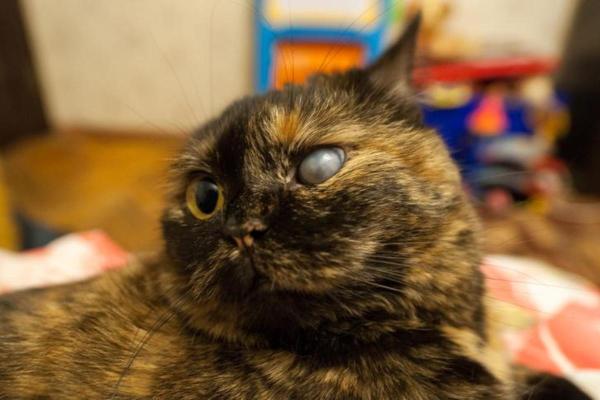
Blindness in cats can occur suddenly, but usually the process is gradual, and the owner may not notice any problems until the cat is completely blind. Medical causes of vision loss include neurological problems, trauma, and cataracts. Fortunately, cats adapt very easily and compensate by developing the sense of smell and touch. Hereditary blindness is more common in purebred cats.
The following AnimalWised article describes the most common problems that cause blindness in cats and how these problems are diagnosed and treated.
Symptoms of blindness in cats
As mentioned earlier, blindness in cats can occur suddenly, but usually the process is gradual. Although it can be difficult for owners to notice that their cat is going blind, there are some signs and behavioral changes that indicate the cat is having trouble seeing:
- They walk close to the walls.
- They walk cautiously with their legs wider apart than usual
- They seem reluctant to jump or run.
- They tend to hide.
- Their movements seem more awkward and unstable.
- They appear more anxious and distrustful.
- The appearance of the eyes may change, becoming more opaque, reddish or cloudy, and the pupils may dilate to receive more light.
So, if you notice your cat exhibiting any of these symptoms, you should visit your veterinarian to find out what is going on with your cat's vision.
Causes of blindness in cats
The causes that can cause your cat to lose its vision are many and varied. They range from systemic diseases to eye diseases or accidents that can cause sudden and quite traumatic blindness for the cat. The following causes may explain why your cat has gone blind:
- Systemic arterial hypertension: elevation of blood pressure is usually related to chronic kidney disease. In cats over 10 years of age it can also be idiopathic or secondary to hormonal problems such as hyperthyroidism, heart disease, elevated intracranial blood pressure or polycythemia.
- Cataracts: Cataracts are one of the most frequent causes of vision loss and are due to the loss of transparency of the crystalline lens, the eye's natural lens. Depending on the degree of opacity, blindness is more or less severe.
- Iatrogenic blindness: in this case the blindness is caused by hypoxia or anoxia during surgery, enucleation of the eye or compression of the arteries when the cat's mouth is wide open for a long time during oral surgery or dental procedures.
- Trauma: Some accidents that cause damage such as eye injuries, retinal detachments, or changes in the lens can cause your cat to lose vision or have it impaired.
- Glaucoma: It occurs gradually, when the eye does not drain fluid as well as it should (similar to a clogged drain). As a result, the pressure in the eye increases and begins to damage the optic nerve.
- Uveitis: Uveitis is the inflammation of the middle layer of the eye, located between the sclera on the outside and the retina on the inside. It affects the iris, ciliary body, pars plana and/or choroid. Read on to learn more about uveitis in cats.
- Corneal ulcers: A corneal ulcer is an open wound in the outer layer of the cornea. It is often caused by an infection. If left untreated, it can lead to blindness.
- Retinal degeneration: This is degenerative damage to the retina usually caused by the use of enrofloxacin at doses greater than 5 mg/kg/day, congenital defects, or dietary taurine deficiency due to low consumption of animal protein in vegetarian or homemade diets.
- Neurological diseases: changes that occur at the level of the neurological system due to infections such as toxoplasmosis, feline infectious peritonitis or cryptococcosis. Blindness in cats can also be causes by tumors of the optic nerves and perineural nerves, hypokalemia, liver disease (hepatic encephalopathy), vascular changes such as ischemia, thrombosis, emboli and vascular, neoplastic or inflammatory changes in the eye.

Diagnosis of blindness in cats
In order to make an accurate diagnosis of the cause of blindness in our cats, it is crucial to gather all the relevant information.
Depending on the age of the cat, some causes are more likely to be suspected than others. For example:
- A young cat: is more likely to lose vision due to infections such as feline herpesvirus type 1, congenital conditions, deformities or trauma.
- An older cat: blindness is usually related to degenerative or iatrogenic causes rather than infectious causes.
It is important to perform a good neurological examination in addition to a general examination to assess reflexes and mental status, eye and retinal examination to diagnose disease, and specific tests to evaluate the cat's vision.
These tests include walking with and without obstacles in a quiet place, repeated in light and dark conditions. Affected animals may bump into obstacles or move reluctantly.
Another test is the threat test, in which a hand is brought closer to the cat's eye. If the animal sees something, it closes its eyes or throws its head back. If not, this could be a sign of blindness.
For cats that barely respond to stimuli, the cotton ball test may be a better idea. Throw a cotton ball in front of the cat and to its sides, if the cat follows the ball it sees correctly, if it does not respond it may be blind.
Treatment for blindness in cats
It is important to know what is causing the loss or severe impairment of your cat's vision in order to effectively treat the problem. With timely treatment, blindness can be reversed in many cats. So if you notice that your cat is clumsier than usual and seems to be having trouble seeing, you should see a veterinarian as soon as possible.
As we mentioned earlier, the main cause of blindness in cats is high blood pressure, which must be treated with antihypertensive medication.
Treatment of eye disease may require surgery in some cases, while in others topical treatments in the form of anti-inflammatory, antiviral, and antibiotic eye drops or ointments may be used. In addition, if the cat has a systemic disease that is exacerbating or causing the blindness, it will require special treatment.

What to do when a cat is going blind?
If your cat has umpired vision, it is advisable to improve auditory communication with your cat. Do not yell at your cat, but talk to them gently and slowly so that they feel your company even if they can not see you. To help your cat get better oriented around the house, you can also:
- Leave objects and furniture in the same place.
- Keep the house tidy and keep the areas most frequented by the cat free of obstructions. A pair of shoes in a different place than usual could be a problem for your cat.
- Do not move the water, food, and litter box.
- Leaving the TV or radio on may help your cat find its way around when it is alone. It is recommended that you do not move the TV or radio.
While this is important with all cats, if your cat is blind, it is even more important to prevent them from going on balconies or having access to the outdoors, as the risk of loss is much greater.

How to prevent a cat from going blind?
Prevention of blindness in cats can be complicated, especially if the cause is genetic. However, there are some things you can do to prevent blindness in cats, for example:
- Make sure your cat is getting a balanced diet that provides adequate energy and essential nutrients like taurine. A deficiency of taurine has been linked to cases of retinal degeneration and blindness, as well as other problems such as dilated cardiomyopathy.
- Pay attention to your cat's eyes and keep them clean to prevent infection.
- Discourage your cat from going outside. This way you can prevent injuries and accidents that can lead to blindness.
- Finally, if your cat's behavior changes or clinical signs of disease or vision loss appear, take your cat to the veterinarian, so you can act as quickly as possible and prevent your cat from going blind forever.
- Check ups with the veterinarian and vaccinations should not be missed.
If you want to learn more about how to feed your cat properly, read this other article about the best diet for cats.
This article is purely informative. AnimalWised does not have the authority to prescribe any veterinary treatment or create a diagnosis. We invite you to take your pet to the veterinarian if they are suffering from any condition or pain.
If you want to read similar articles to Blindness in cats - Signs and treatment, we recommend you visit our Eye problems category.
- S. Cervantes. feline sudden blindness Available at: https://congresoveterinarioibiza.com/wp-content/uploads/Diagn%c3%b3stico-diferencial-de-ceguera-s%c3%babita.-S.-Cervantes.pdf